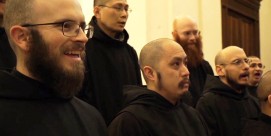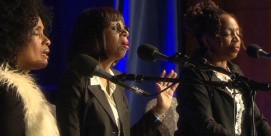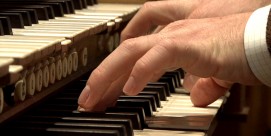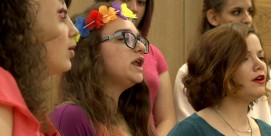In This Episode << SLIDE LEFT TO SEE ADDITIONAL SEGMENTS
Victoria Sirota Extended Interview
Read more of Kim Lawton’s December 6, 2009 interview in New York City with the Rev. Canon Victoria Sirota, pastor and vicar of the congregation at the Cathedral Church of St. John the Divine and the author of Preaching to the Choir: Claiming the Role of Sacred Musician (Church Publishing, 2006):
Talk a bit about the service of Nine Lessons and Carols and what it means.
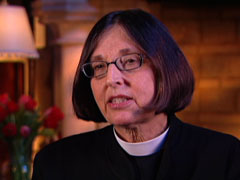 The Festival of Lessons and Carols, in a sense, is a vigil. How do you spend time waiting for something to happen that hasn’t quite happened yet? What do you do if you’re with friends waiting for something? Well, you tell stories, you pray, you sing songs, and that’s exactly what Lessons and Carols does. From a theological standpoint, and actually from a visual standpoint, it is getting that wide-angle lens and moving back and seeing the whole story, seeing the panorama of God’s plan for salvation for humankind and why that was even necessary, so we have to start at the beginning. We start with Genesis.
The Festival of Lessons and Carols, in a sense, is a vigil. How do you spend time waiting for something to happen that hasn’t quite happened yet? What do you do if you’re with friends waiting for something? Well, you tell stories, you pray, you sing songs, and that’s exactly what Lessons and Carols does. From a theological standpoint, and actually from a visual standpoint, it is getting that wide-angle lens and moving back and seeing the whole story, seeing the panorama of God’s plan for salvation for humankind and why that was even necessary, so we have to start at the beginning. We start with Genesis.
Tell us more. Why start with Genesis at Christmas?
Well, the story of Adam and Eve is evocative of profound truths about humanity and our relationship to God, and what you get from that story is this vision of Adam and Eve walking in the evening with God when the cooler breezes are blowing—from having a relationship with the divine, being able to walk with God in the Garden of Eden, which is Paradise, and then disobeying God, feeling shame about it, blaming each other, and then Eve blames the serpent. So they’re always blaming “other”—“‘it’s not my fault, it’s because so and so told me to; it’s not my fault it’s because…,” which immediately sets up a block into your relationship with the Holy One, so they can’t walk in the garden anymore. That’s the saddest thing about that story—that they have lost that ability to be present with the Holy in Paradise, and that story still speaks to us today. We understand that, and I think we long as human beings to get back to a place of Paradise, to get back to a place where things are right and just and beautiful, where there is not anger and fear and evil, and where we are at one with God.
In the service several Old Testament passages are read. Talk more generally about how that leads to Christmas.
In the readings in the Hebrew Bible, in Isaiah especially, we have some beautiful passages about the people of Israel being in exile and longing for Messiah to come, longing for a Savior, longing to return to the city of Jerusalem, longing for that reconnection that is proof that their relationship to God has been reconciled, and so we have promises of the Shoot of Jesse, promises of the House of David, promise that a Messiah will come, and Christianity has taken all of those beautiful promises, and we use them as showing that Jesus was foretold. Probably the most powerful place that that happened for us happened musically, and that’s when George Fredrick Handel decided to choose all those beautiful Isaiah passages and to set them to music in “Messiah,” and we hear that all the time now. Christians—actually everyone in the world is aware of those particularly wonderful passages because they have been set to music so wonderfully, and we do of course sing them a lot at this time of year.
Why is it important and meaningful to weave the scripture readings with the carols and the music?
The Scripture is the basis for our understanding how God operates. We are leaning on the experiences of souls of light before us who have felt connected to the divine, and those are the people that—we really stand on their shoulders. We look to them, the great prophets, Moses, Isaiah, Jeremiah, Elijah—we ponder their stories, their struggles with God, and from that we glean how to have a relationship with God. So those stories are showing us more profound truths. In a sense, the hymns and carols—most of them are based on biblical sources, so they are interpreting for us, and it’s interesting with carols and hymns you have two different things happening at least: You have someone who wrote the text. You possibly have a translator—some of the texts were in Latin or other languages. And then you have a musician, a composer who either wrote the music for that carol or wrote it for something else, and it gets turned into a carol. So it’s very interesting how that process works and how people who sing actually make the decision what it going to end up in that song.
The Scripture and the music build on each other, interpret each other. How does that work?
The music really tells you how to feel about the text. It’s not a small thing. For example, “Joy to the World”: As soon as you start singing it it’s on a high note, you have to support your breath, you’re joyful even singing it. “Silent Night” is more of a lullaby, and it makes you think more of a little baby coming into the world at night time. It settles you into a different place. “O Come All Ye Faithful” is a procession. You can see people lining up and walking. That first verse—seven times the words “O come” are in there, “O come let us adore him, O come let us adore him, Christ the Lord”—so it’s inviting people to join this procession of faithful people across the ages. I think most churches will use it as the opening procession, because it’s a march tempo.
Let’s talk about the difference between Advent and Christmas.
Advent is the church’s preparation for the second coming and also for that first coming again, so we prepare for Christmas, but we also are preparing for the eschaton, for the final things, the second coming, the end of the world. Like Christians always say in Advent, “the end is near,” and we don’t like to talk about that, and the secular world pretty much jumps to Christmas. That’s a much safer place to be than talking about the final judgment and what will happen then. But for Christians it’s important to be thinking every year—it’s like cleaning house, it’s sweeping out, it’s preparing and trying to remember what it is that is really important in our lives and getting back to that, so it’s letting go of our need to try to be in control and remembering to let God be in control so that there is a place to invite God into our hearts.
And how is that reflected in the music?
The music of Advent—a lot of it has to do with John the Baptist, who was the prophet who came before Jesus just a little bit, enough for him to be baptizing people in the River Jordan when Jesus showed up and was calling people to repent and saying the kingdom of God is at hand, make yourself ready, and that’s the message of Advent. The message of Advent is this time is coming. I think the Advent hymns and carols tend to be more eschatological. They’re talking, again, about larger issues other than just a baby Jesus being born. They’re talking about opening our hearts to what heaven is really about. When we then move closer to Christmas and we talk about the Angel Gabriel coming to Mary, then it gets much more specific in preparing for Christmas. We tend to be more comfortable with that. A little baby Jesus is coming, and that’s great, and we know we are all loved by God. But when we get this bigger John the Baptist yelling in our ear from the desert “you should repent,” you should figure out what’s important and follow the truth, follow God, work toward authenticity—that’s a little harder to take.
Christians talk during this time of year about the Incarnation, and a lot of the music of Christmas speaks to that.
Yes. Incarnation means coming into the flesh, literally, so it’s becoming human. What’s wonderful about Incarnation is God actually lowering God’s self to become human and in doing so reminding us of how awesome it is to be human. That original sin with Adam and Eve and that break between divine and human which was so huge—the whole thing changes when God becomes Jesus as a little baby, and now we are reminded that our humanity is not something to be thrown away or discarded. That God would use the Virgin Mary, would use a human mother, that a mother could be the mother of God changes how we think about ourselves, and I would just say in our own lives that often God comes to us in the form of someone else always, and it’s always a human being, and if I go back in my own story about my own conversion as an adult, re-conversion, I can tell you the people who have touched me, where I saw God in them, I saw Christ in them, I saw a love beyond what I could understand and imagine. So, in a sense, God Incarnate is coming to know love in a very personal, very real, and very human way.
You have talked about the God who is far away and the God who is close. Can you talk about that concept and relate it to Christmas?
The transcendent God is God who is the skies, above us, so far away that we often don’t feel any connection whatsoever, or we’re so fearful of God that we can’t imagine approaching God in that form. “Imminent” means that God is right here with us, God’s presence is here now, and that’s the gift of Jesus coming into the world, of being born as a child. In the Christian world, one of the great, great gifts we have been given is the gift of Communion, of Eucharist, of being able to break bread with each other and drink wine, and in that simple act of sharing these very basic things, bread and wine, we believe that Christ is present again with us and becomes incarnate anew, so that every time that we join together in a service of Holy Communion we are reenacting this Incarnation, and God comes in us.
We also spoke about a tie between Christmas and Easter. How are they related, and how does the music show us this?
Well, the interesting thing about Christmas music is that we love best the ones that just tell the story clearly about Jesus being born, about shepherds coming, about angels singing, about wise men coming. We sort of like to leave it there. But there are some carols that hint at what is to come. Our Advent lessons and carols [service] today is going to end with a wonderful hymn “Lo! He Comes!” that really talks about Jesus now having to go and to suffer and die for our sins and then to be resurrected. Also, it’s interesting that Bach’s “Christmas Oratorio”—the very last chorus in it is beautiful and joyful and has a wonderful trumpet solo, but the music is the same music that we sing to the chorale “O Sacred Head Now Wounded,” so Bach is speaking very theologically, knowing that, yes, this is joyous, this is the end of the Christmas festivities, but you know how the story ends.
The themes of hope and joy are really present, and the music highlights that.
“The hopes and dreams of all the years are met in thee tonight”: That’s part of “O Little Town of Bethlehem,” and in this particular carol Phillips Brooks had been in Bethlehem three years before, and he had stood on the hills where the shepherds might have been and looked down at the little, sleepy town of Bethlehem. So here he is at his job as a priest, a young man, and he’s asked to write a text, or a carol, for the Sunday school, and he thinks about looking down at this little town of Bethlehem, and then Lewis Redner, who was not only his organist but also the Sunday school supervisor, was in charge of composing a tune for it, and he couldn’t. Nothing came to him, it didn’t come, and then Christmas Eve he finally had a dream, and the tune was given to him, and it’s chromatic, it’s thorny, it’s beautiful. We know it so well as the American tune for “O Little Town of Bethlehem.” But what it does is it captures the darkness, the sadness, the fear and then also turns it to this hope and this joy in the baby Jesus being born in Bethlehem. The words have meaning, but the melody tells you what that meaning is and how to listen to it. We’re used to Redner’s version in America, but in England they’re used to a different tune, “Forest Green.” The two versions give you a very different sense of those texts. The Lewis Redner—“St. Louis” is the name of the tune—has a much more profound sense of the darkness of being in the city and hoping for something beyond ourselves and of longing that God will come to us. The “Forest Green” version sounds like it’s Christmas morning already. Everything has happened already, and we are safe in heaven with God.
Hope is deep in our communal soul. We want to be saved. We understand that we as human beings somehow let our pride, our egos, take over and when we do that it tends to alienate us from other people. We tend to cut ourselves off. The people who really are the happiest are not the people necessarily with the most things. It’s often people who have a community that they care about, a family where there is love that prevails even in the times of darkness. Almost anything that we face as human beings—if we can face it with other people of faith, other people who share love with us, they can be endured, and I’ve seen this again and again watching couples who have been so in love with each other, and one partner dies and being honored to be able to step into this holy place and to witness this extraordinary love that finally transcends the grave. It’s absolutely clear to me that there is something beyond, and there is a part of us that wants to be part of God, that wants God to dwell within us. I believe we’re happiest when we give. I think we are happiest when we are able to love. This season with the beautiful carols, many of them sentimental, many of them more lullabies, many of them helping us deal with the darkness—they are reminders to us that we are loved and that we are loveable, and in getting to that place it actually allows us not only to give gifts, but to receive love in a way we didn’t think was possible.
The amazing thing about Christmas is that it allows us to celebrate a really profound joy, the joy of being re-found by God, of opening our hearts to that love in a new way and of receiving this light that will transform us and reconcile us not only with God, but with each other.
And the themes of darkness and light?
Advent really is dealing with the fact that our days are getting shorter and that we are losing light, that we feel a sense of darkness encroaching and that the true light of the world now will come in the form of this baby, and if you think of a dark room and just one small, tiny candle, that will indeed make a difference. You will see that. So we’re reminded that even when things seem the darkest, seem the most impossible, seem absolutely like we have lost our way that we look to that light of Christ, and we invite that light within us.
Candles and the verses about darkness and light are important: “The people who walked in darkness have seen a great light.”
Absolutely, and I believe those lights, the Christmas lights, the lights in the store, the shiny baubles that get reflected light—I think that’s our society’s way of trying to be mystical, and I think it works.
What about the meaning that “O Come, O Come Emanuel” transmits?
“O Come, O Come Emanuel” is one of the hymns that is based on Latin chant and is at least nine centuries old or more, and there were “O” antiphons that were written for every day before Christmas, for the eight days before Christmas, and each one had a different word for who was coming, a different word for God: O Come, O Come Emanuel; O Come O Wisdom; O Come O Root of Jesse. But it’s inviting God in, and that’s what Christmas is all about. It’s asking, pleading with God—this yearning, this desire to be reconciled, to get it right once more. Hymns such as “O Come, O Come Emanuel,” which has been chanted through the ages by monks and nuns in processions of faithful Christians—you have this sense of a timeless melody, and you join all these fellow souls of light and the communion of saints when you sing it.
“Hark! The Herald Angels Sing” is very typical in the lessons and carols service.
Charles Wesley, one of the great hymn writers of all time, wrote “Hark! The Herald Angels Sing” and the story goes that he was very moved by the sound of the bells ringing on Christmas morning and that inspired him to write that song. The other interesting fact about it is that Felix Mendelssohn’s music was actually from another secular work that he had composed, and Mendelssohn didn’t think it was appropriate at all, but we have so taken over that tune, and we so accept that as wedded to that particular text that, for us, that is the angels at Christmastime.
What do people feel when they sing that?
This is where heaven and earth meet. In our society I don’t think we’re ever going to get rid of Halloween. We have horror movies at Halloween that remind us that evil is present in the world, and I don’t think in our secular society we’re ever going get rid of Christmas, because we need those angels. We need that image of something outside ourselves, and somehow we know that. Often I talk to people who say they’re atheists, they don’t believe in God, struggle with that, there’s nothing out there, but I have to say that when people who proclaim that to me are then in some grave difficulty, health problems or someone they love is dying, that my conversation is always very different to them, and I don’t need to talk anyone into believing in God. But I have to say in my own experience with life and death and with being with people who are dying and have died that there are mystical things that happen that I cannot explain in any rational way. I’m aware that if we live in a place of hope and faith that opens the door to beautiful things happening, wonderful coincidences that we can’t explain that change our mood from one of darkness and despair to one of joy. Christina Rossetti’s wonderful text “In the Bleak Midwinter” makes this point very well about this moment between heaven and earth coming together in the second verse: “Our God, Heaven cannot hold Him / Nor earth sustain; / Heaven and earth shall flee away / When He comes to reign: / In the bleak midwinter / A stable-place sufficed / The Lord God Incarnate / Jesus Christ.” So that brings together the sense of Advent, when we’re looking towards the end time, and then focusing it finally on this little baby who saves the world.
Is it the words, is it the melody? Is it both?
It is always a combination of the words and melody, as far as I’m concerned. When we sing “Gloria” in “Angels We Have Heard on High” we’re singing this long melisma, all of these notes on one word that allows us to get into a place where we’re actually going beyond the verbal. The music is going to tell you how to feel about it, and oftentimes it will flip you into a nonverbal place of ecstasy. Many, many notes to the same syllable is a way of trying to express the ineffable. We are trying to express what cannot be expressed. We are trying to get to a place of ecstasy that is beyond our normal experience.
How does sitting in a service of lessons and carols take us through all of this?
The gift of lessons and carols is that it takes time, and that you sit there and at the beginning you’re thinking about all those things you should be doing, and hopefully you just take out a piece of paper, write them down, and let them go. And then you let the music, the carols, the texts, the prayers wash over you, and if you do it well you will open your heart into a place of deeper and more profound meditation, and the light will break through. Some text, some image, some musical phrase will change you, and that’ll be the gift you get.
Many different kinds of churches and congregations have taken the traditional lessons and carols service but have changed it, adapted it. What does that say?
The idea of lessons and carols probably comes from the oldest service we have, which is the Easter vigil, and that was very early Christianity, so it’s the idea of waiting around for something to come. What are you going to do? Well, you’re going to sing, you’re going to read scriptures, etc. So for us to keep changing the order of what is read and what carol is sung is absolutely appropriate. It is good and right for us to keep recreating something so that it speaks to us now.
Some people coming to a lessons and carols service may expecting that it’s going to be all the old carols that they know so well, but there may be some carols they are not as familiar with. How does that work into their experience of it?
Lessons and Carols is not a concert. It’s not where you’re going to applaud after everything. You’re going to allow yourself to meditate at a much deeper place. It can be very annoying if you’re expecting to sing carols that you know and are confronted with hymns you’ve never heard before, that go into different places. But my best suggestion is rather than being annoyed at it, talk to God about it, and say, okay, why are you telling this to me now? And then if you open your hearts you’ll find that all of the anthems, all of the carols are going to show you a different side of what you know in the familiar carols , but they’ll help you to attach it to your life now, in the present. Sometimes when we sing carols, we forget the text altogether, and we are at our grandmother’s knee, or whoever first taught that to us. But the gift of new carols is that God is working among us today, even now, inspiring us anew with the Holy Spirit breaking through in new ways, and often the Spirit is talking to you right now, and it could be that that most annoying new anthem or carol is just for you.


